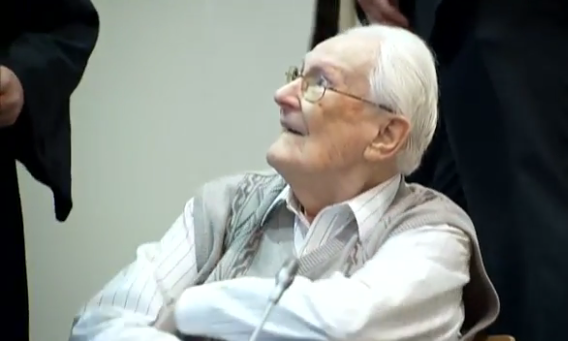As Australians slept last night, 93-year-old former SS guard Oskar Gröning hobbled in to a Lueneburg court to face trial for his role in a Nazi death camp, liberated just over 70 years ago.
Dubbed the “bookkeeper of Auschwitz”, Gröning collected the goods and cash of those who arrived at the camp by train, where between 1.25 million and 1.5 million people died, the majority of whom were Jews.
In a 2005 documentary, Gröning calmly described the horror he bore witness to in the execution camp, where he served from 1944.
“It was not long before I was assigned to supervise the luggage collection of an incoming transport,” he said.
“When this was over, it was just like a fairground, there was lots of rubbish left and amongst this rubbish were ill people, those unable to walk. And the way these people were treated really horrified me.”
“For example, a child who was lying there naked was simply pulled by the legs and chucked into a lorry to be driven away, and when it screamed like a sick chicken, then they bashed it against the edge of the lorry, so it shut up.”
When I read that I thought of my visit to the Sydney Jewish Museum as a teenager. Our guide, a Holocaust survivor, described seeing a child ripped in half by a guard.
Outside of his ongoing trial, Gröning’s memories have served as an important documentation of Nazi crimes as well as a chilling insight into the psychology of evil.
After describing the killing of the child, he explained to the BBC why he and others working in the death camp believed such horrors were justified.
Gröning: "We were convinced by our world view that we had been betrayed by the entire world, and that there was a great conspiracy of the Jews against us."
Interviewer: "But surely, when it comes to children you must realise that they cannot possibly have done anything to you?"
Gröning: "The children, they're not the enemy at the moment. The enemy is the blood inside them. The enemy is the growing up to be a Jew that could become dangerous. And because of that the children were included as well."
After years of public confessions and a failed attempt at prosecution in the 1980s, Gröning came before court last night. A precedent set in a German court since his first prosecution has made a guilty verdict more likely this time around.

His charge is not one that can be easily contemplated. He is accused of being an accessory to the murder of 30,000 people.
40 anti-fascist protesters arrived in the morning to turf out neo-Nazis and holocaust revisionists, according to Deutsche Welle.
They were joined by the families of the plaintiffs, 65 Auschwitz survivors, and eventually a group of neo-Nazis, one of whom described the hearing as “a late Allied revenge trial”. The latter were eventually forced to leave by police.
Gröning had previously described himself as a cog in the machine, and distanced himself from the act of killing – the hundreds of thousands, millions of acts of killing – that took place in Auschwitz and across the German controlled territories of Europe during the Second World War.
His defence evoked one of the central moral questions of the Holocaust: who is to blame? Maybe someone on high pushes the button, but no killing machine can function without well-greased and compliant cogs.
Before the world last night Gröning appeared to change course.
"I share morally in the guilt but whether I am guilty under criminal law, you will have to decide," he said.
The Gröning trial may be centred on a fading 93-year-old, but it has brought to the surface questions Europe and the world have been haunted by since the extent of Nazi atrocities became clear.
What are we to do with a man who accepts moral guilt for the deaths of 30,000 people, who talks about it in a matter-of-fact manner, who has already enjoyed the richest years of his life?
Is this about revenge? Is it the pursuit of justice? Or is it simply a warning from history to those who would commit such acts today: no matter how old you get, no matter how much life you enjoy, you will be pursued to the end.
Eva Pusztai-Fahidi, a Hungarian co-plaintiff and Auschwitz survivor, told media gathered at the Lueneburg court it was about something at the intersection of all of those things.
"In the 70 years since I left Auschwitz-Birkenau, one of the most important events that happened to me is this trial," she said. "It's a very important that I will be able to experience a trial of an SS man who served at Auschwitz. It's not about punishment, it's about the verdict."
* It's recommended that readers familiarise themselves with our commenting policy, before adding a comment to articles. Readers who post comments which deny the Holocaust will have their accounts deleted without notice, and will be banned from the site.
Donate To New Matilda
New Matilda is a small, independent media outlet. We survive through reader contributions, and never losing a lawsuit. If you got something from this article, giving something back helps us to continue speaking truth to power. Every little bit counts.



